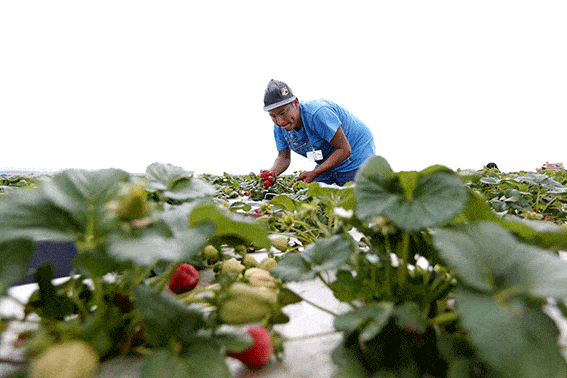South Africa’s new national minimum wage will take effect from January 2019, President Cyril Ramaphosa said on Friday, ensuring workers earn at least R20 an hour. Ramaphosa last month signed into law the national minimum wage bill, part of efforts by the government to tackle wage inequality in South Africa. The National Minimum Wage Act sets the minimum wage at R20 ($1.42) an hour, equal to R3,500 per month.
“We are here to declare that from the 1st of January in 2019, the national minimum wage shall be introduced. No worker in South Africa may be paid below the national minimum wage,” Ramaphosa said at an event in the township of Soweto. Supporters of the minimum wage say it will reduce inequality and stimulate economic growth as workers spend more. But critics say it could lead to increased unemployment, already at record highs, because some employers won’t be able to afford to pay the minimum wage.
The government has said that while the national minimum wage will not end income inequality, it was the first step towards addressing the clamour for a living wage. “We agree that it is far below what we would want for the workers of our country … but it is a start,” Ramaphosa said. Ramaphosa last month signed into law the national minimum wage bill, part of efforts by the government to tackle wage inequality in South Africa.
The National Minimum Wage Act sets the minimum wage at R20 ($1.42) an hour, equal to R3,500 per month. “We are here to declare that from the 1st of January in 2019, the national minimum wage shall be introduced. No worker in South Africa may be paid below the national minimum wage,” Ramaphosa said at an event in the township of Soweto.
Supporters of the minimum wage say it will reduce inequality and stimulate economic growth as workers spend more. But critics say it could lead to increased unemployment, already at record highs, because some employers won’t be able to afford to pay the minimum wage. The government has said that while the national minimum wage will not end income inequality, it was the first step towards addressing the clamour for a living wage. “We agree that it is far below what we would want for the workers of our country … but it is a start,” Ramaphosa said.
The department of rural development and land reform says it has begun discussions with various stakeholders including law enforcement agencies to prevent land grabs. SA has been hit by sporadic land grabs in recent times amid growing fears the country could experience Zimbabwe-style violent land seizures that were led by ousted former president Robert Mugabe. The catastrophic land grabs in that country resulted in an economic and social crisis from which it has struggled to recover.
President Cyril Ramaphosa has moved to quell investor fears over SA’s expropriation of land without compensation drive, often stating that the land reform process will be undertaken orderly and lawfully, and there will be no land grabs. The matter of expropriation without compensation threatens to derail Ramaphosa’s investment drive to boost SA’s ailing economy amid fears that property rights will not be respected.
Parliamentarians, particularly those from the ANC and the EFF, are pushing to amend section 25 of the constitution before the 2019 general elections to make it clear that expropriation without compensation is one of the means that can be used to address skewed land ownership patterns dating back to the apartheid and colonial eras.
Last week both houses of parliament — the National Assembly and the National Council of Provinces (NCOP) — adopted the contentious report on expropriation without compensation, which calls for a constitutional amendment.
In a written reply to a question in parliament from UDM MP Mncedisi Filtane, rural development and land reform minister Maite Nkoana-Mashabane said that land grabs violate the rights of owners, are an affront to land-use laws and are criminal.
“An effective response to land grabs therefore requires collaboration with local government, organised agriculture, traditional leadership, and law enforcement agencies. The department of rural development and land reform has already commenced with bilateral discussions with each of the above-mentioned sectors with a view to develop prevention mechanisms, as well as develop a monitoring system for land grabs, land invasions and land-related criminal acts,” the minister said.
She said while the engagements are taking place, her department routinely intervenes in clearly identified or reported cases of land grabs.
“Such interventions take the form of direct engagements with unlawful occupiers, advice to lawful occupants to report cases to the SA Police Service and direct litigation in those instances where it is in the interest of justice to seek the eviction of the unlawful occupiers,” said Nkoana-Mashabane. Organised land occupations have been more prevalent in urban areas than on farmland outside cities, says Ruth Hall of the Institute for Poverty, Land and Agrarian Studies at the University of the Western Cape.
Hall, who is also part of the advisory panel on land reform that was appointed by Ramaphosa in September, said she attended a South African Local Government Association meeting during which the City of Cape Town presented figures that showed land occupations in the metro spiked more in the first six months of 2018 than in any of the past 10 years. “What this suggests to me is that here has been a political message sent to people that expropriation without compensation is coming and therefore people can occupy land. The state has not in fact agreed and has cracked down on people who are trying to occupy land,” said Hall.
“I think what is needed now is a clear message from the state. On the one hand the state is saying there will be expropriation without compensation; on the other hand, it is evicting people who occupy land including poor people who have nowhere else to go.
“I think there is a third alternative rather than a free-for-all or a crackdown on everyone, which is to say those people who openly occupy land which is not being used, and are doing so only for their livelihoods and because they have nowhere else to go should not be criminalised. We have to embark on a conversation about that issue,” said Hall.
Reuters Dec 7 2018 (Reporting by Olivia Kumwenda-Mtambo; Editing by James Macharia)
The South African Pork Producers’ Organisation (SAPPO) coordinates industry interventions and collaboratively manages risks in the value chain to enable the sustainability and profitability of pork producers in South Africa.









